Police call handlers used fake system for eight years
- Published
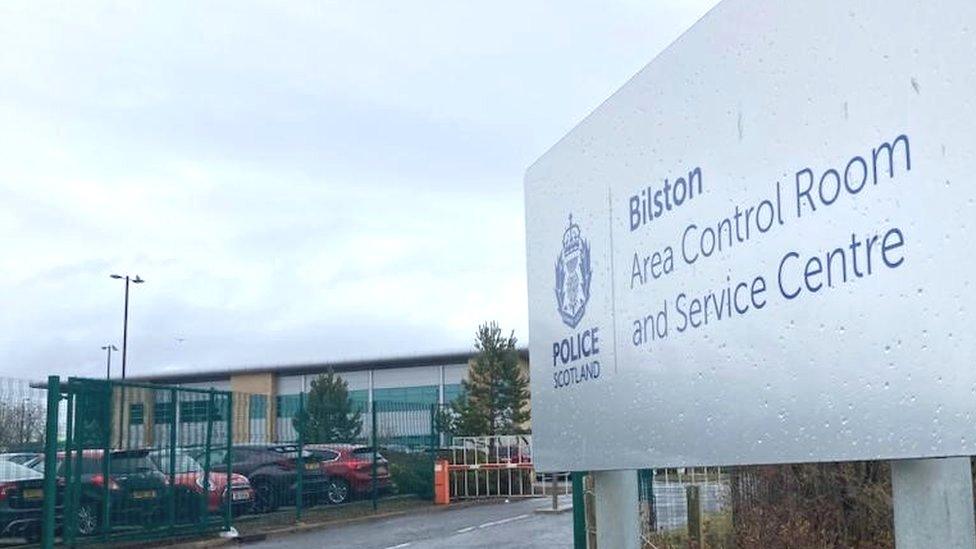
One of Scotland's main police control rooms used a fake system to manipulate response time targets for eight years, according to documents seen by the BBC.
Thousands of calls to the Bilston Glen control room were allocated to a fictitious call sign known as DUMY.
Internal systems would register that the calls had been passed to officers - but instead they were parked on a list.
This meant a police vehicle would not have been dispatched quickly to calls which had been judged as high priority.
It appears that many calls were not attended at all.
The practice, according to official police documents, was designed to "provide artificial levels of incident management performance".
The documents reveal that the DUMY call sign was used at Bilston Glen in Loanhead, Midlothian, from at least 2007 until the system was discovered in 2015 and stopped.
Police Scotland said the practice should not have been used after the creation of the national police force in 2013, and was "permanently discontinued" in March 2015.
The practice appears to have ended just four months before the M9 tragedy in July 2015. Lamara Bell and John Yuill died after their car lay undiscovered for three days after a crash, despite police being alerted.
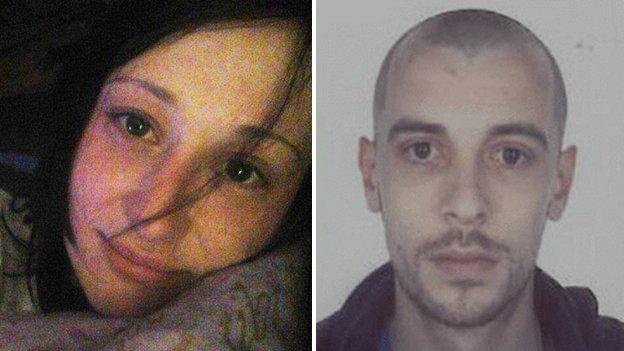
Lamara Bell and John Yuill were found inside their car after it crashed down an embankment off the M9
Police Scotland was criminally prosecuted and admitted that failures in its call handling processes at Bilston Glen contributed to the death of Ms Bell.
The lawyer who acted for one of the bereaved families has told the BBC they were never told about the DUMY process.
David Nellaney, of Digby Brown, said this was information which should have been disclosed to the families.
He added: "I'm astonished to be perfectly honest. I think that puts the wider public at risk if calls are not being actioned… and to not respond to them and put them into a DUMY system whereby there's no guarantee that they'll come back to them, is quite shocking.
"I think it probably gives an indication of potentially the practices that were going on. When you adopt that type of practice you're bringing in factors such as human error, which have played a part in what happened with Lamara and John."
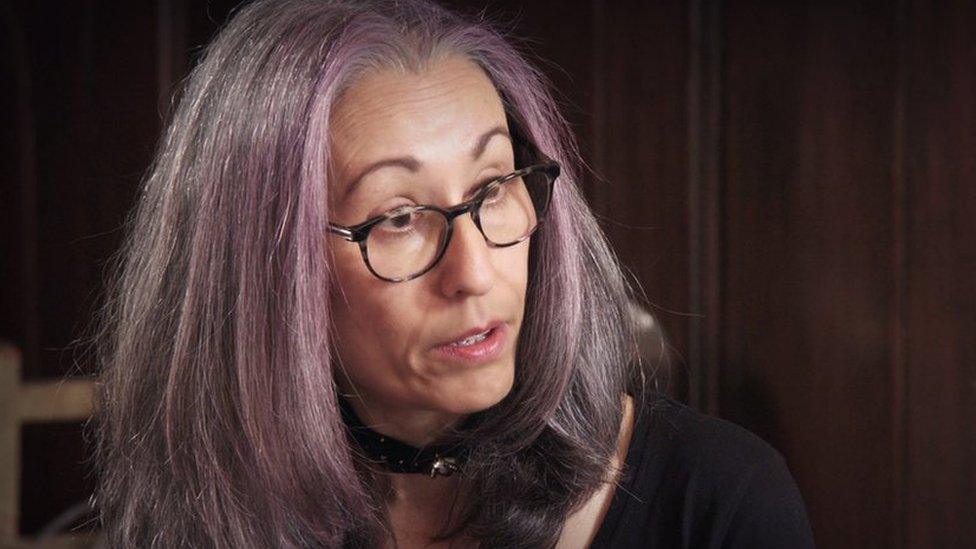
Moi Ali said the system sounded like "an attempt at deception"
Moi Ali, who was on the board of the Scottish Police Authority watchdog from 2013 to 2017, said this was the first time she had heard of the system.
"These are exactly the kind of things that should be flagged to the board so that we can start an internal investigation or inquiry," she said.
"So if that was concealed from us, I find that very, very concerning."
Two heavily-redacted documents were released to BBC Scotland after a lengthy Freedom of Information (FOI) process with Police Scotland.
An undated official misconduct document says an officer was being disciplined for conduct which "discredits the Police Service or public confidence in it".
It states that staff at Bilston Glen utilised a "fictitious call sign known as 'DUMY', which had been introduced to prevent the activation of internal alarms and provide artificial levels of incident management performance."
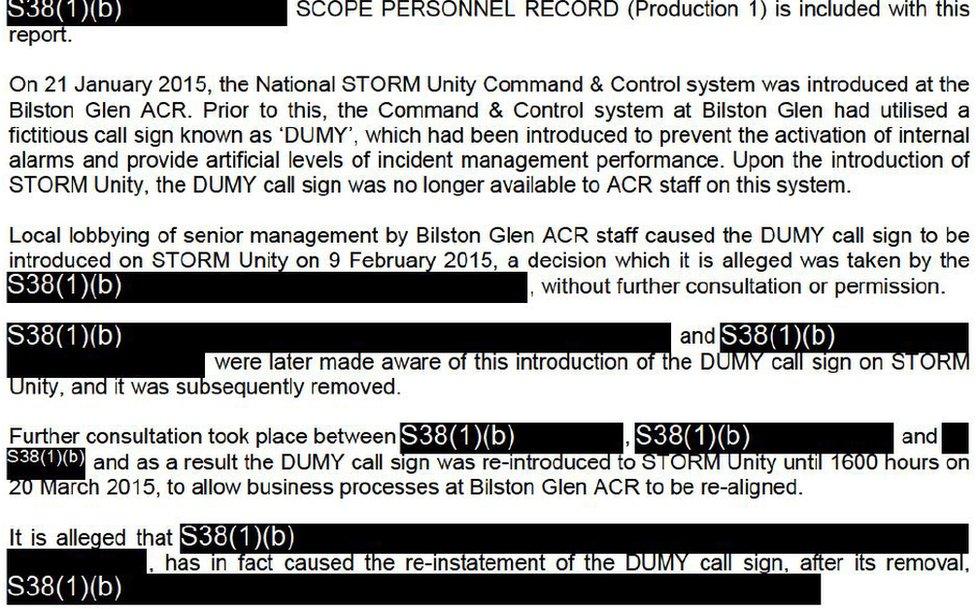
Each police car is given a four letter or number call-sign, which is used to allocate the calls which are received by the force.
When a call was given to DUMY, the system would recognise that it had been allocated successfully - but instead, these calls were parked on a separate list.
This would help artificially inflate the centre's call-handling response times.
These internal targets were not published, but the then Chief Constable Stephen House was known to be target-driven, and staff have previously spoken about the pressure to meet them. Stephen House has been approached for comment.
A report by Her Majesty's Inspectorate of Constabulary in Scotland (HMICS) - the independent body which scrutinised Police Scotland - highlighted understaffing as one of the issues which contributed to the control room's problems around the time of the M9 crash.
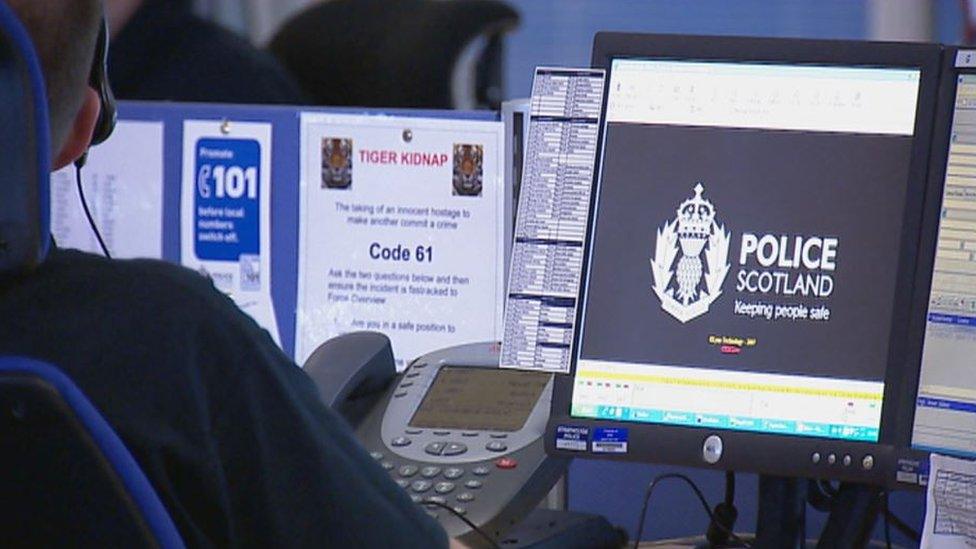
However, the HMICS investigation into the call-handling process at Bilston Glen makes no mention of the DUMY system.
A HMICS spokesperson told the BBC its inquiry "did not include a retrospective inspection of historical practices before this period" and declined to say whether or not it knew about the practice.
A second briefing document, dated 28 July 2015, reveals that the DUMY practice was in use at the Lothian and Borders force from at least 2007, and continued for two years after the country's regional forces merged into Police Scotland in 2013.
It states that being placed on the DUMY list would cause the incident "to go to the bottom of the controller's incident list".
The practice was halted briefly in January 2015, when the control system was being upgraded to a new system known as Storm Unity, and the DUMY call sign was no longer available.
But staff at Bilton Glen "lobbied" senior management to re-introduce it to the new system, and this was approved by a senior person whose name and title has been redacted on the documents.
The DUMY system was up and running for another six weeks before a member of the Glasgow control room noticed and raised the alarm.
In December last year, the BBC learned that Police Scotland chiefs had been so worried about the DUMY practice that they launched an internal investigation, led by then Ch Supt Paul Anderson.
Investigation carried out
We asked Police Scotland, under FOI, to provide a copy of his report. It told the BBC that it "does not hold a copy of the report requested".
However, Mr Anderson, now a Deputy chief constable at Humberside Police, confirmed to the BBC that he did in fact carry out an investigation, and produced a report.
A spokesman for Mr Anderson told the BBC he "undertook a review on request of the chief officer team. The review pertained to an allocation practice in a particular call centre.
"A report was completed with recommendations made. The subject of the report and its findings is a matter for Police Scotland to formally comment on."
The BBC asked Police Scotland whether it had shredded the report. The force said it no longer holds the report, in line with its data retention policy.
One of the documents Police Scotland did release includes a table of how many calls were allocated to the DUMY call sign in the six weeks between 9 February and 21 March 2015.

Calls are graded when they come in to the control room in order to decide how they should be handled.
A priority one call is designated as "immediate" and described as "an ongoing incident where there is an immediate or apparent threat to life or a serious crime in progress". Police Scotland targets stipulate that a police car must be dispatched within five minutes.
A priority two call is designated as "priority" and described as an incident "where there is a degree of urgency associated with police action". priority two calls should be dispatched with 15 minutes.
It appears that 101 priority one calls were allocated to the DUMY call sign during that six-week period. This suggests none was dispatched within the five-minute target. The table suggests only 29 of these calls were attended at all.
In the same period 822 priority two calls were allocated to DUMY. The table suggests only 238 of these were attended.
If the numbers for that six-week period were averaged out over the eight years, it would suggest around 7,000 priority one calls were allocated to the DUMY call sign, with around a third actually being attended.
Using the same extrapolation, more than 50,000 priority two calls may have been allocated to the DUMY call sign, with around a third being attended.
'An attempt at deception'
The briefing paper says that all the priority one incidents "are currently being viewed in order to confirm that there are no unresolved incidents remaining in the system".
It adds: "Direction on the requirement for a review of all DUMY incidents is sought from senior management."
Moi Ali said the DUMY system sounded like "an attempt at deception".
"I think it cuts to the very heart of public trust and confidence in policing," she said.
"When you're at your most vulnerable and you dial 999, you really expect to get a quick service."
A Police Scotland spokesperson said: "The DUMY call sign was a practice which had been in use by one legacy service since 1997 to assist controllers to allocate resource during periods of high demand.
"The practice should not have continued under Police Scotland and local use of the call sign in one service centre was halted in January 2015 when a new command and control system was introduced.
"The practice was permanently discontinued in March 2015 and appropriate action taken to address further use of the call sign between February and March 2015."